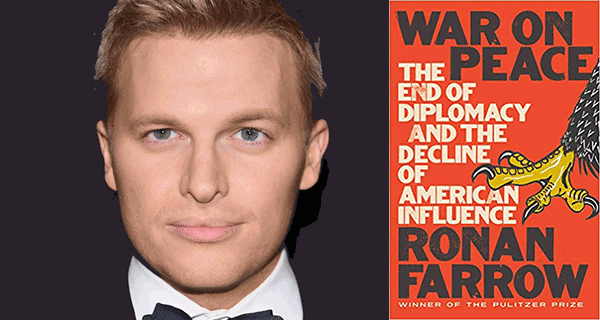
War on Peace: The End of Diplomacy and the Decline of American Influence (2018) by Ronan Farrow is a prescient work in the sense that it was five years in the writing, predating the diplomatic idiocy of U.S. President Donald Trump by a good three years.
Its opening chapters detail the initial steps to weaponize the diplomacy era of former president Barack Obama in Pakistan, Afghanistan and Syria, and detail how drone strikes on IS adherents foretold the gradual and then wholesale slippage into generals in the White House, and Pentagon policy forestalling and even demonizing diplomacy in the conduct of American affairs.
The old heroes of the State Department who Farrow worked for in his four-year career in diplomacy, people such as Robin Raphel, Thomas Countryman and the eminent Richard Holbrooke, are profiled as their careers are increasingly overshadowed by a growing preference for military solutions, and eventually the arrival of the Trump White House.
For anyone with a fundamental belief in the value of negotiation, difficult collaboration and messy (but human) compromise, War on Peace is not a happy read.
As we fast forward to the Trump era, year two, the end points of the policy drift that Farrow charts are predictable and beyond frustrating.
While the Trump administration’s ditching of the Paris climate accord and the Iran nuclear deal are rooted as much in dissing the Obama legacy as in the failure of Trump’s advisers to appreciate that peace often comes from principled dialogue, the net effect is to continue the pre-existing trend. The replacement of old-fashioned, face-to-face diplomacy with tweets, F-18 rattling, braggadocio and a simple-minded reliance on force is now predominant.
Throughout War on Peace, we read of the growing debate about the future utility of maintaining embassies and diplomatic staffs when a simple presidential tweet can do the job of putting your enemies (and as Canadians have seen, your friends) on notice.
War on Peace has three points of focus: it’s at once a case study of a privileged young man’s post-law-school public service career, a history of the U.S. State Department’s decline over the past several decades, and a subtle call-to-arms for millennials considering a public service career.
Farrow subliminally raises the issue of his own career’s next steps in his deft interweaving of all three aspects of the book. As a national essayist on the #MeToo phenomenon, New Yorker writer on a broad array of investigative topics, and as author of War on Peace, he’s covering the waterfront on multiple issues at the forefront of urbane, intelligent American public life.
So what’s next for Farrow?
I think he epitomizes the young millennial talent that the U.S. Democratic party so desperately needs to counter the aging, male, white, rural anger that underpins Trump’s base.
Farrow is a New York resident. He recently won a George Polk Award, and has been nominated for the National Magazine Award. As an attorney and former State Department official, he’s well tutored in how the system works. He’s also hauntingly good looking and, as shown in his book’s photographs, palpably at ease in the company of much older experts.
Trump is 72 and the prevailing U.S. political cycle dominated by baby boomers is inevitably ending. Farrow, at the age of 30, may suggest infancy in a potential presidential candidate. But consider that John F. Kennedy published his Pulitzer Prize-winning volume of short biographies in 1957 – when still a senator at age 40. He became the youngest U.S. president at age 43. In 2020, Farrow will be 33. Assuming Trump defeats the Democratic challenger in 2020, his second term ends in 2024. Then Farrow will be 37.
Whether now or later, his youthful combination of analytical intelligence, public service, public profile and muted Hollywood glamour (he’s Mia Farrow’s son) has definitely worked for other presidential hopefuls.
Does he want a broader public life than he has? Does he have a sufficiently large base from which to build a national political career?
You can infer from War and Peace that he champions the devotion to public service of the likes of Holbrooke, Countryman and Raphel. He absolutely laments the lack of their values in public life today.
I think he’s poised to act on his convictions.
Troy Media columnist Mike Robinson has been CEO of three Canadian NGOs: the Arctic Institute of North America, the Glenbow Museum and the Bill Reid Gallery.
For interview requests, click here.
The opinions expressed by our columnists and contributors are theirs alone and do not inherently or expressly reflect the views of our publication.
© Troy Media
Troy Media is an editorial content provider to media outlets and its own hosted community news outlets across Canada.

